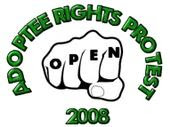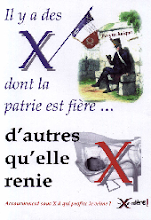
PHILADELPHIA INQUIRER
March 7, 2008
N.J. considers unsealing adoption records
By Adrienne Lu
Inquirer Trenton Bureau
Robert Hafetz spent most of his life wanting to know who his birth parents were.
Hafetz, who was adopted as an infant in New Jersey and now lives in Warrington, Bucks County, started searching four years ago and discovered his birth mother had died in 1977. In the process, the 57-year-old met two half-brothers, who have welcomed him into their family.
He says that having access to original birth certificates would help other adoptees answer the nagging questions of identity that haunt some from the time they are children.
But some parents don't want to be found. Philip Foley of South Jersey and his wife, who asked not to be named, are among those fighting to keep birth records sealed by New Jersey.
Foley testified on his wife's behalf against opening up records before a Senate committee in January, telling lawmakers how she gave up her daughter for adoption after being raped as a teenager.
"I was free from him, free from what was growing on me," she says of the act of giving up the infant.
About 11 years ago, the daughter initiated contact with Foley's wife, they said. Foley's wife says she made it clear she wanted no part of the woman's life. But after that, they said, the woman contacted various members of Foley's family, revealing a secret Foley's wife feared could destroy her family. The woman has continued to contact the family periodically since, Foley said.
"It's like enduring what I endured back then and it's just horrible," she said.
Nationwide, the number of states opening up access to records for adoptees is small, but growing. In New Jersey, a bill to open records sponsored by Sens. Joseph Vitale (D., Middlesex) and Diane Allen (R., Burlington), has cleared the Senate and is moving to the Assembly.
Until now, those on Foley's side of the debate - which includes an unusual combination of advocates, including the New Jersey Catholic Conference and the state chapter of the American Civil Liberties Union - have succeeded in keeping the records sealed. Some argue the confidentiality promised to mothers giving up children for adoption should be protected, regardless of what the law says on the issue. Others believe adoption rates could drop and abortion rates rise as a result.
Various bills to open birth records to adoptees have passed either the Senate or the Assembly over the years, but never both.
Vitale acknowledged the delicate balancing act between the rights of the mothers and the adoptees. "Adoptees will tell you it's about knowing who they are," Vitale said. "It's a huge void in their lives, and we're trying to help them fill it in a way that makes sense and respects as best we can everyone's point of view."
Vitale's bill would allow birth mothers who gave up their children for adoption before the law takes effect one year to notify the state that they do not wish to have their names released, if their adult children should request it.
Those mothers would be required to periodically update forms to the state with medical, social and cultural information.
After the law's effective date, all children adopted in New Jersey would have access to their original birth certificates, including their mother's names, once they turned 18. Mothers could indicate whether they wished to be contacted, and if so, how.
Senator Bill Baroni (R., Mercer), who was adopted, struggled for months with the issue. Baroni and his sister were both adopted and while he has never felt a desire to learn his birth parents' identities, his sister, who is unrelated to him by birth and is now deceased, longed to know who her birth parents were since she was young.
Baroni ultimately decided to vote in favor of opening up the birth certificates. "There are wonderful stories to adoption," Baroni said. "I'm hoping this legislation will continue to promote an amazing gift."
Adam Pertman, executive director of the Evan B. Donaldson Adoption Institute, a national nonprofit organization based in Boston, testified before the Senate committee that there are many benefits and few drawbacks to opening adoption records.
Studies have found that between 80 percent and 95 percent of birth mothers want some information on or contact with the children they gave birth to, Pertman said. In the handful of states that have unsealed birth records to adoptees, only a small percentage of birth mothers have objected, he said.
According to the Adoption Institute, in Kansas and Alaska adoptees 18 and older have always had access to their original birth certificates. Since 1996, Alabama, Delaware, Maine, New Hampshire, Oregon and Tennessee have granted adoptees some access to records.
Pennsylvania allowed adult adoptees access to their original birth certificates until 1985, said Pam Hasegawa, a spokeswoman for the New Jersey Coalition for Adoption Reform and Education. Since then, none of the efforts to reopen the records has succeeded.
New Jersey has about 150,000 sealed adoption records, said Hasegawa, who is an adoptee herself.
"We need access to updated and accurate medical history, which none of us has," she said.
Few dispute that adoptees should have access to their family's medical histories. But advocates on the other side of the issue argue that information can be shared without violating the privacy of the birth mother.
John Tomicki, of the League of American Families, who is against opening up records, is pushing for a compromise that would place the burden on the state to obtain birth mothers' permission before releasing their names. The New Jersey Bar Association favors a mutual consent registry, in which birth mothers and adoptees who are open to being contacted can register. Only in cases where both parties register would names and contact information be made available.
Hafetz managed to find his birth mother's name without the state's help. His experience was so profound that he quit his job as a therapist to write a book about it and devote his time to helping other adoptees.
"You reach a point where you just can't go on any more without knowing," said Hafetz. "The experience of searching and going back is like opening a door to a room in your mind that you've had locked shut all your life."
But Foley and his wife say if both parties in an adoption are not interested in exchanging information, the government should not intervene.
"I just ask for compassion," she said. "If it's consensual, go for it, but if it's not, I'm sorry, you just have to deal with what life gives you."
For a statement explaining New Jersey's S611, the adoption bill, go to http://go.philly.com/
NJAdoptStatement
Read the actual N.J. Senate bill at http://go.philly.com/NJAdopt
Contact staff writer Adrienne Lu at or alu@phillynews.com.
Link to article








No comments:
Post a Comment